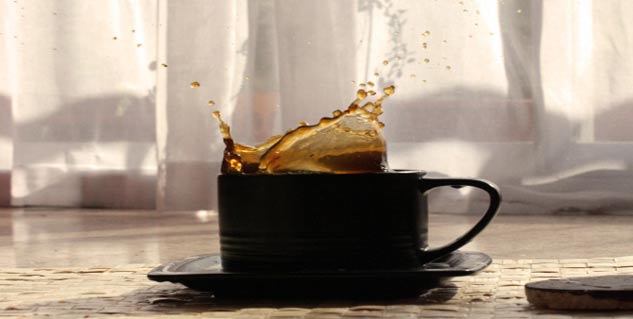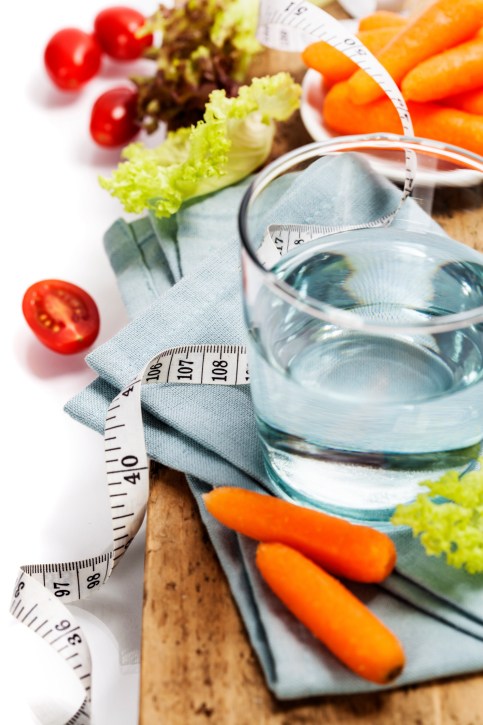Lose Weight > Common Sense To Lose Weight > Common Sense Article > Are You Really What You Eat? Probably Not!
Are You Really What You Eat? Probably Not!
Digestion starts with our mouth and finishes with our intestines. We assume that our entire digestive system is working as intended; but the reality is that it probably isn't - not even close.
So let's start with the mouth, typically responsible for mechanical/chemical digestion of the food.
The mouth is responsible for chewing up food and mechanically breaking it down into smaller pieces. I'm not saying that you should chew every bite 30 times, but I am saying that it would be beneficial to chew a bit more than you probably do. When I ate food (a while back), you would swear that I was in a contest or the food at any moment could get up and run away. I took a bite, chewed a couple of times and down it went.
Problem: I wasn't breaking my food down to give my body the best chance to get everything out of it. Imagine that you had a block of ice that weighed 100lbs and you put it on your sidewalk on a sunny day. It would probably take a couple of days for it to melt completely. Now, imagine taking that same block and shaving it down to itty bitty pieces the size of ant ... it would melt in minutes. Give your stomach that same chance at breaking things down in a more efficient manner and don't be surprised if the gas and bloating begins to diminish, you have more energy, or you get better results in the gym.
The mouth is also where carbohydrates start to break down. Saliva contains an enzyme called amylase. This enzyme begins to break down carbohydrates before they even hit your stomach. So think about that the next time you slam some orange juice, soda, or your protein shake. Even though it sounds a bit weird, even chewing your liquid drinks would do your body some good!
The next stop ... the stomach. Be sure to check out Part 2 when I talk about a deficiency that YOU probably have and don't even know it.
Does this sound like you? You are getting older, you are under stress, often overeat, and/or eat a great deal of junk food. If so, you are probably have a hydrochloric acid (HCL) deficiency (a.k.a. stomach acid).
Some Signs of Hydrochloric Acid Deficiency:
· Depression
· Undigested food in stool
· Loss of taste for meat
· Estrogen build-up
· Acne rosacea
· Desire to skip meals
· Gas, bloating, burping shortly after a meal
· Constipation
· Heart burn
· Bad breath
· Foul smelling stools
· Food allergies
· Weak, cracked nails
· Chronic yeast infections
Having too little hydrochloric acid is much more common than having too much. You are probably thinking - so then why do I get heart burn? It sure feels like acid. Well, it is. It's just an acid produced by food rotting in the stomach due to lack of digestive enzymes and hydrochloric acid. It's a bi-product of putrefaction (the decomposition of animal proteins by anaerobic microorganisms). The normal chain of events is for food to leave the stomach and flow downward into the small intestine. But it isn't designed to cope with food in this state (rotting in the stomach), so it stays where it is and ends up moving in the other direction instead - up the stomach and into the esophagus. Eeeeewwwww!!!!!!
From Charles Poloquin: "After taking numerous functional medicine seminars from digestion experts such as Dr. Nigel Plummer, PhD, from Wales; and Dr. Jeff Baker, NMD, from North Carolina, I realized how important it is to monitor stomach acid. In Wales alone, it is estimated that over 40 percent of the adult population is deficient in hydrochloric acid. In the USA, many experts estimate the deficiency also to be in the range of 40 to 50 percent. Some gastroenterologists are now advancing that it is today's most under-diagnosed ailment."
If I were you, I'd go get your HCL levels tested! Then work with your doctor and come up with a plan.
OR
You can do what I did:
1. Get a large bottle of HCL with Pepsin (tablet or capsule form)
2. Take 1 capsule at the beginning of a meal.
3. Finish meal.
4. Assess how you feel post-meal.
a. If you have a very intense burning sensation stop, HCL is back to normal.
b. Keep taking 1 per meal for 2 days.
5. If after 2 days there's no burning, go to 2 capsules before each meal for 2 days.
I followed this system until I got to 6 capsules before each meal. Finally, on the 2nd day I was ON FIRE! Then I reduced to 5 before each meal until burning, then down to 4, etc.
DISCLAIMER: I am not a doctor. (I just want to put that out there.)
A couple of things: Don't be surprised if it takes a good bit of pills and days before you feel a burning. The more stress in your life, lack of sleep, lack of exercise, lack of good nutrient-dense food, lack of vitamins/minerals, etc., the longer it takes to fix the situation. How long could you be on HCL? Well, I have been on it for a month and now am down to 5 pills. The good news is that with 1 and 2 pills, my bloating was gone almost instantly, I got leaner, felt better and now I feel like I am getting better results out of the gym!
Next in the stomach ... agua. Water. The ever-so-important liquid you can't live without. Do you drink a lot of fluid with your meals? This is usually what happens when you don't chew enough. Since you didn't chew up your food and cover it with enough saliva, you have to make up for it by drinking extra water, so the food can get down. I, and your stomach, have an issue with this. Here's why. Take your favorite drink and add 16oz of water to it. Do you think it tastes the same? Nope, it tastes (and is) diluted. Water dilutes your stomach acid just the same. You need that acid at its strongest so your food is properly broken down. I'm not telling you not to drink, but back off the 3 glasses of water with your meal and chew!
Tune in next time for the last stop on our digestive tour ... the intestines!
Last stop on our digestion journey ... the intestines!
Imagine that you're just getting over being sick. You had to take some antibiotics to get healthy, and in the process destroyed all the GOOD healthy bacteria that are necessary for digestion and absorption. Compare this person lacking healthy bacteria with someone who has been taking supplements and food that promote healthy bacteria. They are not getting the same calories and nutrients out of the food. Here's another way to look at it. Two kids are in a class, identical in every way. One is blindfolded and has earplugs in during class the other has no restraints of any sort. After 12 weeks of school, do you think they walk away with the same knowledge? NOPE.
The small intestines are about 20ft long and food is primarily digested there. There are medications and certain foods that cause your small intestine to lose its ability to figure out what to absorb and block. This condition is called leaky gut syndrome.
What causes leaky gut? Doctors are not completely sure, but agree on a few factors: medications such as antibiotics (their job is to kill bacteria - good AND bad - this medicine is an equal opportunist); NSAIDS like ibuprofen (cause damage to intestinal lining); diets full of junk food, sugar, trans fats, processed foods etc., not to mention diets low in FIBER; and the last culprit to add to the list ... STRESS! Stress affects just about everything when you think about it. Stress = less blood flow to your organs = food sits around longer while being digested = more problems.
If you think you have leaky gut syndrome, go to your doctors and get tested.
There are a few things you can do to maximize absorption in the intestines and possibly correct leaky gut syndrome.
DISCLAIMER: Again, I am not a doctor. These are steps you can take that can be found all over the Internet. Always consult your doctor first.
Protocol Options:
· Remove gluten and dairy from your diet for a couple of weeks. Both gluten and dairy can be inflammatory to the small intestine and blunt nutrient absorption. (Drinking milk is actually meant for babies and babies only!)
· Supplement with probiotics, prebiotics, antioxidants and glutamine.
· Probiotics and prebiotics will help replenish the good bacterial flora. When supplementing, look specifically for lactobacillus acidophilus and bifidobacteria bifidum. Also, the best brands are usually refrigerated.
· Antioxidants: I like buffered vitamin C, E and r-ala or na-r-ala.
· Glutamine: Take 10 grams with each meal (60-80 grams a day). Follow this for 5 days then maintain with 20-30 grams a day (best post-workout). Did I mention glutamine is the primary building block on the intestinal lining? This load can help seal the lining, eventually leading to no more leaky gut syndrome.
Advanced Body Solutions is Charlotte North Carolinas premiere Personal Training company. Advanced Body Solutions specializes in weight loss, fat loss, toning and losing those last couple pounds. Make sure to follow us on our twitter and youtube accounts for more up to date information. You can also visit our website at www.eastcoastabs.com and sign up for our Free Ebooks, Tips and Newsletters. If you are interested in taking us for a test drive, make sure to sign up for your Complimentary Body Diagnostic, Body Fat Test, Health Analysis Report and 30 minute workout!
Related Articles
-
30 Day Weight Loss Diet Meal Plans
The basic idea of a weight loss meal plan is to help you consume lesse
-
Weight Loss Help � Some Important Tips
Weight management advice is almost freely available online � especial
-
Manage The Festive Season: Fitter not Fatter
I have been thinking about Christmas a l
-
Tips for losing stubborn belly fats.
We get plenty of health inquiries each d
-
Lose Weight With These Five Health Foods
Weight loss is a billion dollar industry
-
Learn to Cook - Lose Weight, Gain Friends
Finding simple ways to reduce my waistline is always a personal ob
- DON'T MISS
- Simple to Follow Advice to Help You Lose Weight
- The Cure For Post Holiday Cravings
- Pot Belly Is Not Just About Your Tummy
- Emotional Eating.
- The Best Way To Shed Excess Weight By Eating For Power
- How To Reduce Fat – Basic Tips
- Best Weight Loss Practices
- Finding Diets That Work
- Dementia risk higher in those with chronic conditions
- Liquidate Unwanted Weight




